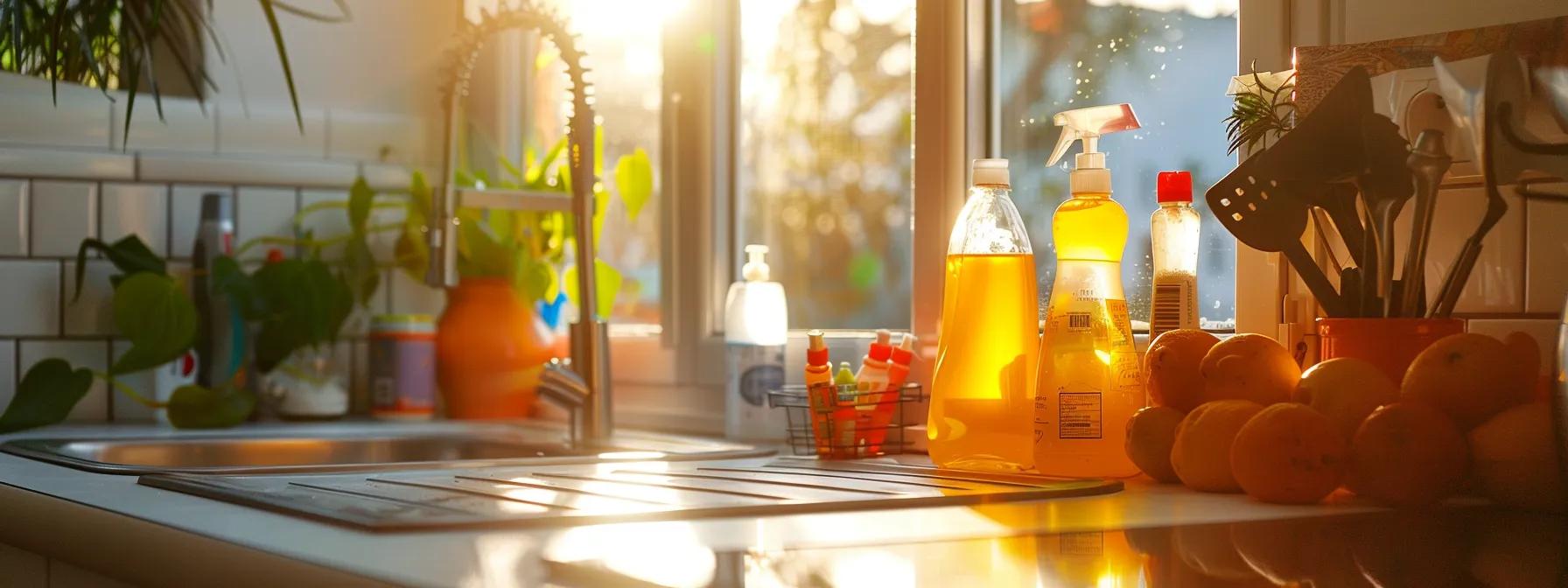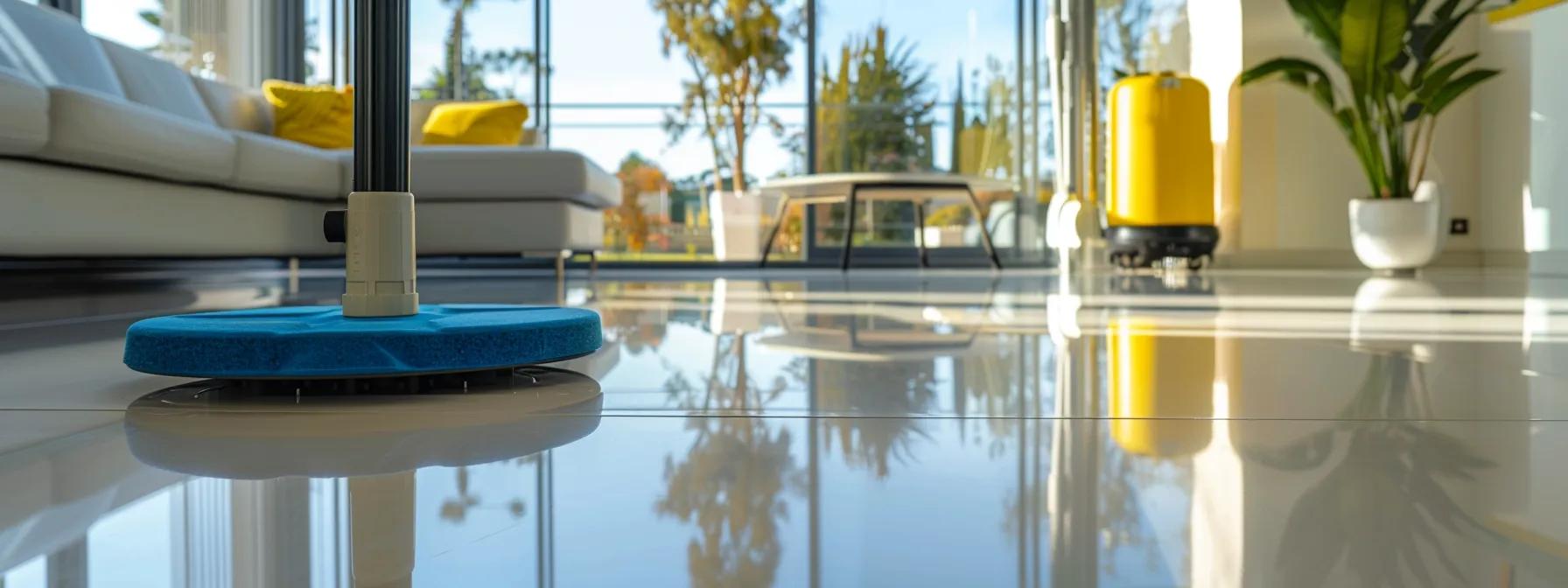Keeping your tile and grout clean often involves harsh chemicals that can affect your health and the environment. This guide explores eco-friendly tile and grout cleaning solutions, effective techniques, and how to choose sustainable tiles for your home. By using natural cleaning agents and water-saving methods, you can maintain spotless floors and carpets without compromising safety. Learn how to create a healthier living space while protecting the planet with these sustainable cleaning practices.
Key Takeaways
- Choosing sustainable cleaning products protects the environment and promotes a healthier home
- Natural ingredients like vinegar and baking soda effectively clean tile and grout
- Regular maintenance using eco-friendly methods extends the lifespan of tiles
- Essential oils enhance cleaning solutions with antibacterial properties and pleasant scents
- Steam cleaning offers a chemical-free approach to deeply clean tiled surfaces
Understanding Eco-Friendly Tile and Grout Cleaning Solutions
Choosing sustainable cleaning options is vital for maintaining bathroom tiles and grout while protecting the environment. Environmentally friendly products effectively combat mold and prevent water damage without harmful chemicals. Using the right tools, such as specialized brushes, ensures thorough cleaning. Understanding these eco-friendly solutions promotes a healthier home and supports long-term cleanliness.
The Importance of Choosing Sustainable Cleaning Options
Choosing sustainable cleaning options for your shower and other tiled areas reduces reliance on harsh chemicals like bleach, which can be harmful to both health and the environment. Eco-friendly products, such as those containing vinegar, effectively remove stains without leaving toxic residues, ensuring a safer home for your family.
Embracing green cleaning methods also simplifies maintenance tasks like mopping, as these solutions are often easier to rinse and require fewer repeated applications. This approach not only preserves the longevity of your tiles and grout but also supports a cleaner, healthier living space:
- Uses natural ingredients to combat mold and mildew
- Prevents water damage with gentle yet effective cleaners
- Reduces environmental impact by minimizing chemical runoff
- Enhances indoor air quality by eliminating harsh fumes
Common Natural Grout Cleaning Chemicals
Common natural grout cleaning chemicals include white vinegar, known for its effectiveness as a cleaning agent, and baking soda (sodium bicarbonate), which helps scrub away dirt and stains. Lemon juice adds natural freshness, while hydrogen peroxide serves as a disinfectant. Additionally, essential oils enhance eco-friendly cleaning by providing pleasant scents and antibacterial properties.
White Vinegar and Its Effectiveness
White vinegar serves as an effective cleaner for tile and grout, thanks to its natural disinfectant properties. Its acidic nature helps eliminate mildew and other common household mold issues without the need for harsh chemicals. In kitchens, white vinegar can tackle grease and stubborn stains, ensuring surfaces remain both clean and safe for food preparation.
Incorporating white vinegar into regular cleaning routines enhances overall hygiene by breaking down grime and preventing water damage. When combined with hydrogen peroxide, it boosts its antimicrobial effectiveness, providing a comprehensive solution for maintaining spotless and healthy living spaces. This sustainable approach not only protects the environment but also promotes a safer home for families.
Baking Soda for Scrubbing Away Stains
Baking soda proves effective on porcelain and ceramic tiles by loosening tough stains, making it easier to scrub away grime without causing damage. Before applying the solution, using a vacuum cleaner to remove loose particles ensures maximum effectiveness. This method maintains the integrity of the grout and tiles, prolonging their lifespan.
Incorporating baking soda into cleaning routines can complement steam cleaning, enhancing the removal of embedded dirt and preventing mold growth. For more detailed guides and eco-friendly tips, subscribers can sign up through email, ensuring they stay informed on the best practices for maintaining a healthy home environment.
Lemon Juice for Natural Freshness
Lemon juice effectively eliminates unpleasant odors from grout, leaving a naturally fresh scent in your home. Its natural acidity breaks down grime while providing a safe alternative to chemical deodorizers.
When combined with sodium carbonate, lemon juice enhances cleaning power, making it easier to remove stubborn stains. Using a toothbrush ensures precise application, while microfiber cloths can be used to wipe away residue and achieve a spotless finish:
- Mix lemon juice with sodium carbonate to create a potent cleaning solution.
- Apply the mixture to grout lines using a toothbrush for targeted cleaning.
- Scrub gently to lift stains and neutralize odors.
- Wipe the area with a microfiber cloth to remove excess moisture and ensure a streak-free shine.
Hydrogen Peroxide as a Disinfectant
Hydrogen peroxide functions as a mild acid, making it a potent disinfectant for grout by effectively eliminating bacteria and inhibiting mold growth. Unlike conventional detergents, it breaks down grime without leaving harmful residues, promoting a healthier home environment.
To enhance its disinfecting capabilities, it is essential to vacuum the area beforehand to remove loose particles. This ensures that hydrogen peroxide can penetrate deeply into the grout, safeguarding not only the tiles but also protecting nearby upholstery from damage caused by stronger chemicals:
- Vacuum grout lines to remove debris.
- Apply hydrogen peroxide directly to the grout.
- Allow it to sit for several minutes to act as a disinfectant.
- Scrub with a soft brush to eliminate bacteria and stains.
- Wipe clean with a microfiber cloth for a fresh appearance.
The Role of Essential Oils in Eco-Friendly Cleaning
Essential oils play a crucial role in eco-friendly cleaning by enhancing the effectiveness of natural mixtures used on various surfaces, including marble and concrete. Oils such as tea tree and eucalyptus possess natural antibacterial properties, making them ideal for disinfecting grout without the need for harsh chemicals. When integrated into cleaning solutions, these oils help eradicate mold and mildew, ensuring that tiled areas remain hygienic and safe for household use.
Incorporating essential oils into everyday cleaning tasks, such as scrubbing the toilet or preparing a dishwashing liquid alternative, provides both functionality and a pleasant aroma. For instance, a mixture of lemon oil and lavender can be used to clean grout lines around the toilet, effectively removing stains while leaving a fresh scent. This approach not only promotes a healthier home environment but also supports sustainable cleaning practices by reducing reliance on synthetic fragrances and toxic ingredients.
Techniques for Eco-Friendly Tile and Grout Cleaning
Eco-friendly tile and grout cleaning techniques include using natural ingredients for deep cleaning and steam cleaning for a chemical-free approach. These methods effectively remove dust and soil, ensuring thorough cleaning without harming surfaces like leather.
Regular maintenance tips, such as using a spray bottle for easy application, support long-term cleanliness. Adopting these sustainable practices helps maintain spotless tiles and grout while minimizing environmental impact.
Using Natural Ingredients for Deep Cleaning
Natural ingredients, such as lemon, provide effective solutions for deep cleaning slate tiles and grout. Lemon’s natural acidity breaks down stubborn stains and eliminates odors, ensuring surfaces remain fresh and spotless. When combined with eco-friendly epoxy sealants, lemon not only cleans but also helps protect grout lines, enhancing their durability and appearance.
After thorough cleaning, applying a sustainable sealant is crucial for maintaining the integrity of tiles and grout. An eco-friendly epoxy sealant acts as a protective barrier, preventing future stains and making routine maintenance easier, similar to how a dishwasher maintains kitchenware. This combination of natural cleaning agents and protective sealants ensures a long-lasting, healthy home environment.
Utilizing Steam Cleaning for a Chemical-Free Approach
Steam cleaning employs high-pressure steam to effectively penetrate the porosity of tiles and grout, eliminating grease and embedded dirt without the use of harsh chemicals. This method is particularly beneficial for maintaining rock surfaces, ensuring deep cleanliness while preserving the integrity of the material.
Using tools like a sponge during steam cleaning enhances the removal process, allowing for precise application and gentle wiping of surfaces. This approach not only maximizes the efficiency of steam in cleaning but also ensures that porous materials remain undamaged, promoting a healthier and more sustainable home environment.
Implementing Regular Maintenance Tips
Implementing regular maintenance is essential for sustaining hygiene and ensuring the cleanliness of tile and grout surfaces. Utilizing eco-friendly spray solutions on a consistent schedule enhances indoor air quality and prevents the buildup of mold and mildew:
- Schedule weekly cleaning sessions using natural spray cleaners.
- Inspect grout lines monthly for signs of wear or damage.
- Use microfiber cloths to effectively lift and remove dirt without harsh chemicals.
- Ensure proper ventilation during and after cleaning to maintain air quality.
In addition to routine cleaning, performing timely restoration tasks helps preserve the longevity of tiles and grout. Regular maintenance not only upholds hygiene standards but also minimizes the need for extensive repairs, contributing to a healthier and more sustainable living environment.
Eco Freindly tile and Grout Cleaning Agent Comparison
Natural Cleaning Ingredients Effectiveness Comparison
Selecting Eco-Friendly Tiles for Sustainable Homes
Selecting eco-friendly tiles involves benefits of using recycled materials and exploring natural stone and ceramics. Understanding sustainable manufacturing processes ensures reduced moisture and promotes antimicrobial surfaces. Incorporating tools like spray bottles and steam cleaning enhances maintenance. For more information, customers can reach out via email address.
Benefits of Using Recycled Materials
Using recycled materials for porcelain tile offers significant environmental benefits. By repurposing waste from sources like laundry facilities, homeowners can reduce the demand for natural resources such as granite. This sustainable approach not only conserves materials but also decreases the need for chemical cleaners like sodium percarbonate, promoting a healthier home environment.
Choosing recycled porcelain tiles can also be a cost-effective solution, much like managing expenses with a credit card. These eco-friendly tiles often require less maintenance and have a longer lifespan, providing value over time. Additionally, supporting recycled materials encourages responsible manufacturing practices, contributing to a more sustainable and resilient community.
Exploring Natural Stone and Ceramics
Natural stone and ceramic tiles are excellent choices for sustainable homes due to their durability and low environmental impact. When maintaining these surfaces, using a high-quality scrubber for floor cleaning ensures that grout lines remain free from dirt and debris without the need for excessive chemical use. Incorporating eco-friendly methods, such as using minimal salt solutions, can enhance the cleaning process while preserving the integrity of the materials.
Proper maintenance of natural stone and ceramics often involves the use of sodium-based cleaners, which effectively remove stains and prevent mold growth. It is essential to wear personal protective equipment, such as gloves and masks, when handling these cleaning agents to ensure safety. By following these practices, homeowners can maintain the beauty and longevity of their eco-friendly tiles while supporting a healthier living environment.
Understanding Sustainable Manufacturing Processes
Sustainable manufacturing processes for eco-friendly tiles prioritize the use of renewable resources and minimize waste through efficient tools and machinery. By integrating natural oils and environmentally safe lubricants, manufacturers reduce the reliance on harmful chemicals, ensuring that the production of tiles remains eco-conscious:
- Utilizing energy-efficient machines to lower carbon emissions
- Incorporating recycled materials to decrease waste
- Implementing pest control measures that are safe for the environment
- Employing non-toxic oils and lubricants in the production process
- Optimizing tool usage to enhance production efficiency
These sustainable practices not only reduce the environmental footprint of tile manufacturing but also contribute to the longevity and quality of the final product. By adopting such methods, manufacturers ensure that eco-friendly tiles are both high-performing and aligned with green building standards, fostering healthier living spaces for consumers.
The Impact of Eco-Friendly Cleaning on Health and the Environment
Eco-friendly tile and grout cleaning minimizes chemical exposure by using natural liquids like baking soda and vinegar instead of harsh cleaners. This approach improves indoor air quality by reducing toxic fumes from traditional products.
Natural solutions, including clay-based cleaners, ensure safe environments for areas dealing with urine or food residues, supporting both health and environmental sustainability.
Reducing Chemical Exposure in Your Home
Using eco-friendly products like borax and essential oils significantly reduces chemical exposure in homes. Borax effectively cleans grout and tiles without the harshness of traditional cleaners, while essential oils not only provide natural fragrances but also offer antibacterial benefits. Homeowners can find numerous safe cleaning recipes and tips on platforms like Pinterest, making it easier to maintain a healthy living environment.
Addressing common issues such as soap scum on travertine surfaces becomes simpler with sustainable solutions. By avoiding strong chemical cleaners, the integrity of travertine is preserved, preventing damage and prolonging its natural beauty. These green methods ensure that indoor air quality remains high and that families are safeguarded from potential chemical irritants.
Enhancing Indoor Air Quality With Natural Cleaners
Using natural cleaners significantly enhances indoor air quality by eliminating the release of harsh chemical fumes commonly associated with traditional cleaning products. Tools such as squeegees effectively remove excess cleaning solutions from tile surfaces, reducing airborne particles and maintaining a fresher environment. Additionally, using paper or microfiber cloths for wiping ensures that surfaces are free from residual cleaning agents that could compromise air quality.
Incorporating natural powders and essential oils into cleaning routines further improves indoor air quality by neutralizing odors and preventing mold growth around caulked areas. Regular maintenance, including the application of vitrification techniques, helps seal grout lines and prevent moisture buildup, fostering a healthier living space:
| Tool/Ingredient | Purpose |
|---|---|
| Squeegee | Removes excess cleaning solutions to minimize airborne particles |
| Microfiber Cloths | Wipe surfaces without leaving residues |
| Natural Powders | Absorb odors and prevent mold growth |
| Caulk | Seals grout lines to prevent moisture buildup |
| Essential Oils | Provide natural fragrances and antibacterial properties |
Frequently Asked Questions About Eco-Friendly Grout Cleaning
This section addresses key questions about eco-friendly grout cleaning, including the effectiveness of natural methods compared to chemical ones, suitable tile and grout types for natural cleaning, optimal maintenance frequency, and the professional use of sustainable options. Topics explore the use of mineral-based cleaners, bristle brushes, foam solutions, juice applications, and appropriate pH levels to ensure thorough and safe cleaning practices.
Are Natural Cleaning Methods as Effective as Chemical Ones?
Natural cleaning methods can rival chemical solutions in effectiveness when addressing grout maintenance. In Sydney, for instance, using a mixture of baking soda and vinegar, often measured with a teaspoon, is a popular option for stain removal around sinks, effectively removing debris without introducing harmful substances:
| Ingredient | Purpose |
|---|---|
| Baking Soda | Acts as a gentle abrasive to scrub stains |
| White Vinegar | Breaks down grime and eliminates odors |
| Teaspoon | Measures appropriate quantities for mixing solutions |
| Sink | Common area for grout cleaning |
| Debris | Removes particles and buildup from grout lines |
These natural solutions not only provide effective stain removal but also ensure a safer environment by minimizing exposure to toxic chemicals. By choosing eco-friendly products, homeowners in Sydney can maintain clean and healthy spaces, particularly around frequently used areas like the kitchen sink, without compromising on performance.
What Types of Tiles and Grouts Can Be Cleaned Naturally?
Natural cleaning methods are suitable for a variety of tile types, including ceramic, porcelain, and cement-based tiles. Using eco-friendly solutions like tea tree oil can effectively remove stains and prevent mold without compromising the beauty of the surfaces. These natural ingredients interact with the oxygen in the air to break down grime, ensuring that tiles remain spotless and vibrant.
Grouts made from cement materials also benefit from natural cleaning approaches. Gentle cleaners that avoid harsh chemicals help prevent corrosion and maintain the integrity of the grout lines. By selecting appropriate natural products, homeowners can preserve both the aesthetic appeal and structural soundness of their tiled areas, fostering a healthy and attractive living environment.
How Often Should I Maintain My Tile and Grout?
Regular maintenance of tile and grout is essential to preserve their appearance and functionality. It is recommended to clean high-traffic areas, such as bathtubs and kitchen tiles, at least once a week to prevent the buildup of grime and deter pests from nesting in the grout lines. Consistent cleaning ensures that surfaces remain hygienic and reduces the need for more intensive treatments later on.
Establishing a systematic cleaning schedule using appropriate products can significantly enhance the longevity of tiles and grout. Incorporating tools like abrasive cleaners and gels, along with defoamers, can streamline the process and deliver optimal results. Below is a recommended maintenance frequency to help maintain a spotless and healthy home environment:
| Area | Frequency | Recommended Products |
|---|---|---|
| Bathtub | Weekly | Abrasive cleaner, Cleaning gel |
| Kitchen Tiles | Bi-weekly | Defoamer, Mild detergent |
| Bathroom Grout | Monthly | Grout cleaner, Essential oils |
| Entryway Tiles | Weekly | Mild detergent, Microfiber cloth |
Can I Use Eco-Friendly Options Professionally?
Professional cleaning services can effectively incorporate eco-friendly options by utilizing hoses fitted with specialized nozzles that deliver natural ingredients such as eucalyptus oil. This approach ensures thorough grout cleaning while minimizing the use of harmful chemicals, maintaining both the quality of the surfaces and environmental standards. Additionally, using stainless steel tools enhances durability and efficiency, allowing cleaners to achieve superior results without compromising sustainability.
When addressing areas like kitchen tiles and ovens, eco-friendly professional cleaners rely on safe ingredients that effectively remove grease and stains without damaging stainless steel surfaces. By choosing sustainable cleaning methods, these professionals not only protect clients’ homes but also contribute to a healthier environment. This commitment to using natural solutions demonstrates expertise and dedication to long-term cleanliness and safety.
Frequently Asked Questions
What are the best natural chemicals for grout cleaning?
Alliance Cleaning Services recommends natural alternatives for grout cleaning that are effective and safe. Common choices include white vinegar, which breaks down mold and mildew, and baking soda, known for its gentle abrasive properties.
Additionally, hydrogen peroxide is favored for its disinfecting capabilities, while lemon juice offers natural bleaching effects. These eco-friendly solutions ensure clean, hygienic grout without harsh chemicals.
How Can I Choose Eco-Friendly Tiles for My Home?
Choosing eco-friendly tiles begins with selecting materials that have minimal environmental impact. **Alliance Cleaning Services** recommends ceramic, porcelain, or natural stone tiles, which are durable and recyclable. Prioritize tiles with low volatile organic compounds (VOCs) to ensure a healthier home environment.
Consider the tile’s life cycle and maintenance requirements. Opt for products that require less frequent replacement and are easy to clean, reducing water and chemical use. **Alliance Cleaning Services** emphasizes the importance of sustainable sourcing and certifications to guarantee the tiles meet eco-friendly standards.
What Techniques Ensure Effective Eco-Friendly Tile Cleaning?
Effective eco-friendly tile cleaning uses non-toxic, biodegradable cleaners that remove dirt without harming the environment. Techniques like steam cleaning penetrate grout lines deeply, eliminating bacteria and allergens for a healthier living space.
Additionally, microfiber tools enhance cleaning efficiency while minimizing water usage. Alliance Cleaning Services employs these sustainable methods to achieve spotless, environmentally responsible results for all tile and grout surfaces.
How does green cleaning benefit my health?
Green cleaning utilizes environmentally friendly products, decreasing exposure to harmful chemicals. This improvement in air quality can lead to fewer respiratory issues, reduced allergies, and overall better health.
Green cleaning methods also lower the presence of toxins in your environment. By maintaining cleaner air and surfaces, these practices contribute to a safer and healthier living or working space for all occupants.
Are eco-friendly grout cleaners as effective as conventional ones?
Eco-friendly grout cleaners are just as effective as traditional ones. They use natural ingredients that effectively remove dirt and stains without the need for harsh chemicals, ensuring your tiles stay clean and safe.
Choosing green cleaning solutions also benefits your health and the environment. Professional services like Alliance Cleaning Services prioritize these sustainable methods, delivering excellent results while maintaining high standards of cleanliness.
Conclusion
Adopting eco-friendly tile and grout cleaning methods ensures a safer and healthier home environment. Utilizing natural ingredients like vinegar and baking soda effectively removes stains and prevents mold without harmful chemicals. Regular maintenance with sustainable solutions preserves the longevity of tiles and grout while minimizing environmental impact. Embracing these practices supports overall well-being and promotes a cleaner, more sustainable living space.




